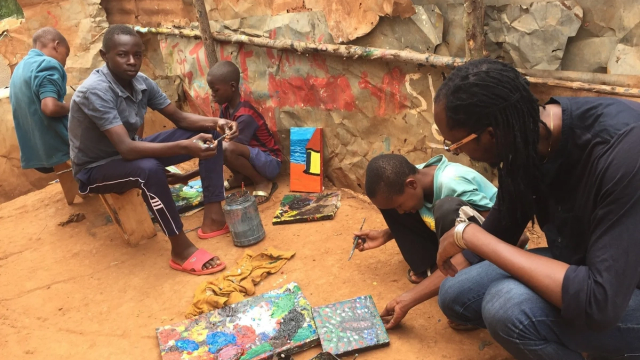The Art of Healing: Post-conflict recovery at the community level
By Liz Moyer
KIGALI, RWANDA, MAY 2016 - Healing from a traumatic experience fascinates me. I was born to be a psychotherapist — but in a day and age when one in seven people live in extreme poverty, and the reality of inequality is a video-click away, I knew I’d be more fulfilled working at the macro level. So I entered the sustainable development field, where instead of assisting people one-on-one with their individual healing, I work with institutions, policies, and organizations to assist systemic healing.
I knew from the beginning that my trip to Kigali, Rwanda would open up a whole new world on what it means to heal at a collective level. With over 100 years of war and a recent genocide that still haunts the international community, I was curious to see how people at the local level are coping; how people are recovering from the trauma of losing 1/11th of their population in a matter of 100 days; how a community of people rebuilds itself after next door neighbors attack and brutally kill one another.
I met a 29-year old artist named Innocent who moved back to Rwanda in 1997 after he and his family took refuge in Uganda for several years. We recognized each other as fellow “feelers” from the beginning, so diving into deep conversation came easily. We exchanged life stories, spiritual lessons, and the fears and hardships that taught us these things.
He told me stories from his childhood about how his house had been raided six times by military guerilla groups from South Sudan. He went into details about one particular instance, his memory of the event blowing me away: He was four years old when 50 military men stormed his neighborhood, ransacking and burning down every house in sight. When it came to his house they used one of his dad’s friends as a decoy to enter, and then wreaked havoc on the people and place. The men confined the adults to one corner of the house and grabbed Innocent by the neck to do their bidding. After bouncing him up and down against the concrete floor like a tennis ball they ordered him to go into each room of the house and collect money for them.
As the lead man screamed at Innocent to find him money, Innocent’s four-year old self began to play with the belligerent man: “Oh, it’s over here,” as he points to an empty box. “What is money? I don’t know what that is?” For even at four years old, Innocent had been used to this type of a situation and had grown creative in how to handle it.
Prior to the raid Innocent’s mom, a very clever woman, had the boys take all of their family’s savings and line every page of the Bible with the bills, zipping up the edging of the book when they were done. As the intruder’s tolerance for Innocent’s toying had reached its limit, the man erupted with frustration, over-throwing everything in the room, taking even the most menial of goods, and storming out.
Innocent’s family fled, expecting the house to be lit in flames, like past raids. Hours later, realizing that didn’t happen, they returned to their house to find it barren. Everything they had owned was stolen except for the books — the books, including the Bible with the hidden money, had no value to a group of illiterate soldiers. Mom knew well.
I absorbed Innocent’s story as we sat in the café of his Kigali art center. His dark eyes and willingness to share such a deep, personal story resonated with me, reflecting his strength. We finished our coffee and traveled a block or two down the road to a part of town where paved roads, up-to-date education, and food security were still being established. He introduced me to a group of 25 kids ranging from 6 to 18 years old who are part of a local art program that he and his brother support. Innocent provides art lessons, acrylic paint and canvasses to the group of kids, passing on the empowerment and solace he received from creating and sharing art. He told me how his mom always encouraged him to draw, paint, and use his imagination. She encouraged him to never give up on his dreams, and now he’s able to pass this on to these kids and the community at large.
Through meeting people like Innocent, exchanging stories, and opening myself to explore the history and present time of Rwanda, I received affirmation about my theories on the world – that no matter where you go you can find people from your own “tribe;” people who experience the world similarly to you, and therefore dance with it in a like-minded way. The use of community to heal wounds, the wisdom of Innocent’s mom that serves as the basis for his path, the resilience of the human spirit. Having the opportunity to be reminded of these universal patterns of healing in a new place with new people was a gift.
He left me with one of his personal mottos:
“Every hardship, challenge and experience of destruction leaves us with raw materials to build something new.”
True that, brother. May we all keep this in mind as we move forward in addressing our global challenges, seeing them as opportunities, not a burden.
Innocent Nkurunziza and his brother Emmanuel Nkuranga are co-founders and owners of the Inema Art Center in Kigali, Rwanda. The word “Inema” comes from both of their names and is a Kinyarwanda word that means giving, sharing, cultivating, and talent. Their children’s art program is called “Art with a Mission.” To learn more about their work and the community events held at the center visit their website at www.inemaartcenter.com.
